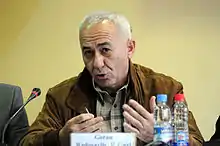Goran Radosavljević
Goran "Guri" Radosavljević (born 1957) is a Serbian former police colonel general and the Commander of the Gendarmery of Serbia from 2001 to 2004.[1] He had prominent role during the Kosovo War, as the head of cluster of counter-terrorism teams that combated the Kosovo Liberation Army (KLA).
Goran Radosavljević "Guri" | |
|---|---|
 Radosavljević in November 2010 | |
| Born | 1957 (age 63–64) Aranđelovac, SR Serbia, SFR Yugoslavia |
| Police career | |
| Allegiance | Serbia |
| Department | Operational Group (1997–1999) Gendarmery (2001–2005) |
| Service years | 1985–2005 |
| Status | Retired |
| Rank | Colonel General |
Early life
He was born in 1957 in Aranđelovac, SR Serbia, SFR Yugoslavia.[2] Radosavljević graduated from the Faculty for Physical Culture.[2] He worked in the Ministry of Internal Affairs of Serbia since 1985.[2] He initially taught in special combat, and then became the head of the relevant department.
After the Kosovo War
He became the first commander of the re-established Gendarmery of Serbia on 28 June 2001 and stayed in that position until 17 August 2004. On 1 February 2005, he was retired from the service.[3]
In 2003, the United States agreed to the deployment of 1,000 Yugoslav soldiers to Afghanistan, commanded by General Goran Radosavljević.[4][5]
On 17 December 2006, the Serbian police issued a warrant for Goran Radosavljević,[6] however with no indictment being issued against him. In 2007, he went public and denounced the rumors that he had been hiding.
By 2010, Radosavljević had decided to join the Serbian Progressive Party and enrolled in politics. In May 2014, Radosavljević was named the Executive Committee member of the ruling Serbian Progressive Party (SNS).
War crime allegations

During the Kosovo War (1998–1999), he led a cluster of counter-terrorism teams that were known as the Operational Group (OPG). They were established to counter Kosovo Liberation Army which sought to separate Kosovo from Serbia. The OPG were later suspected of killing 41 ethnic-Albanian civilians in the Ćuška massacre in western Kosovo in May 1999.[7]
A number of human rights groups have claimed that the OPG committed war crimes against civilians. Radosavljević was the person in charge of the military operation in Račak on 15 January 1999, which would become known as the Račak massacre.[8][9] The Serbian War Crime's prosecutor also brought him in connection with the killing of the Bytyqi brothers, three Albanian American brothers who came to Kosovo to fight on the side of the KLA.[10] Radosavljević was in charge of a Serb police training facility at Petrovo Selo where the Bytyqi brothers were detained, tortured, executed, and buried in a mass grave.[11] In December 2018, US State Department issued sanctions on Radosavljević after credibly implicating him in the 1999 murder of the Bytyqi brothers.[12]
References
- Photos of Goran Radosavljević
- Bugarinović, Nebojša (14 February 2007). "Ko je Goran Radosavljević Guri?". slobodnaevropa.org (in Serbian). Retrieved 19 July 2019.
- "Guri: U Tadićevom obezbezbeđenju "nešto debelo ne valja"". blic.rs (in Serbian). Fonet. 6 May 2010. Retrieved 19 July 2019.
- Srpski žandari pod američkom komandom
- Serbia Will Send Troops And Police to Afghanistan
- "Potraga za Gurijem". b92.net (in Serbian). Beta. 13 February 2007. Retrieved 19 July 2019.
- Prevent Genocide International
- icty
- "Guri:U Račku smo pobili teroriste". Archived from the original on 3 September 2012. Retrieved 18 April 2010.
- The Bytyqi Case - Crime and Secret
- bytyqibrothers.org. "Timeline". Retrieved 13 May 2014.
- "U.S. bars Serbian implicated in LIers' murders". Newsday. Retrieved 18 February 2019.
External links
- Goran Radosavljević Guri at vreme.com (in Serbian)